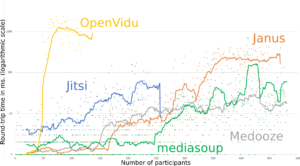Pion seemingly came out of nowhere to become one of the biggest and most active WebRTC communities. Pion is a Go-based set of WebRTC projects. Golang is an interesting language, but it is not among the most popular programming languages out there, so what is so special about Pion? Why are there so many developers […]
Search Results for: mediasoup
Breaking Point: WebRTC SFU Load Testing (Alex Gouaillard)
If you plan to have multiple participants in your WebRTC calls then you will probably end up using a Selective Forwarding Unit (SFU). Capacity planning for SFU’s can be difficult – there are estimates to be made for where they should be placed, how much bandwidth they will consume, and what kind of servers you […]
SDP: Your Fears Are Unleashed (Iñaki Baz Castillo)
We have have had many posts on Session Description Protocol (SDP) here at werbrtcHacks. Why? Because it is often the most confusing yet critical aspects of WebRTC. It has also been among the most controversial. Earlier in WebRTC debates over SDP lead the to the development of the parallel ORTC standard which is now largely merging back into the […]




